2012版中考复习精品课件英语外研版(含11真题)第四讲七年级(下)Modules_7~12
文档属性
| 名称 | 2012版中考复习精品课件英语外研版(含11真题)第四讲七年级(下)Modules_7~12 | 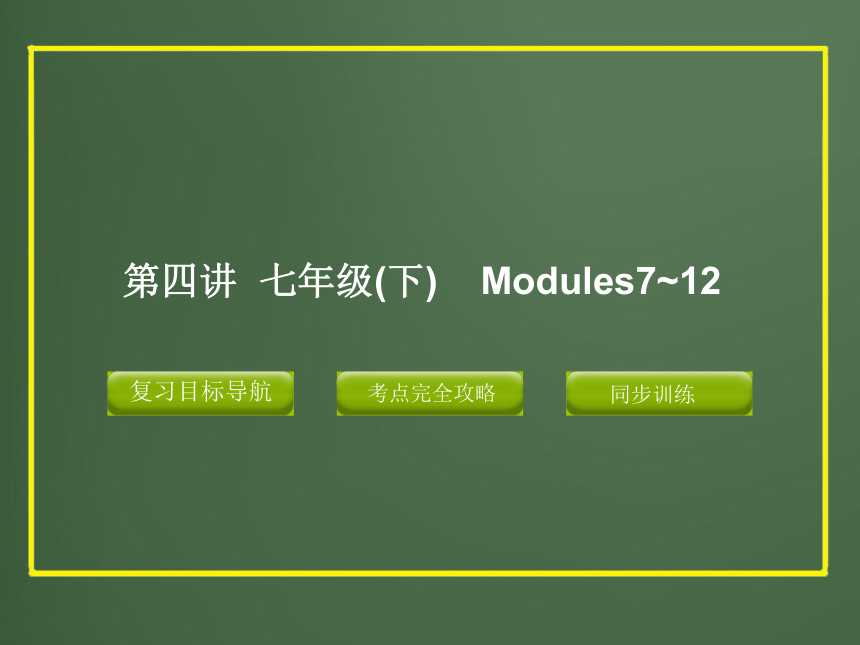 | |
| 格式 | zip | ||
| 文件大小 | 528.1KB | ||
| 资源类型 | 教案 | ||
| 版本资源 | 通用版 | ||
| 科目 | 英语 | ||
| 更新时间 | 2012-04-12 08:37:50 | ||
图片预览

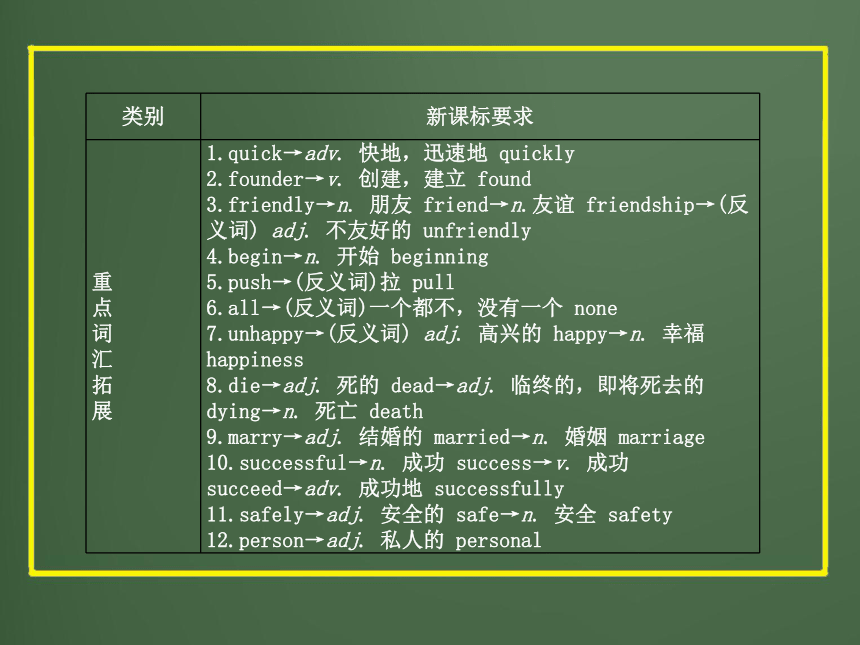
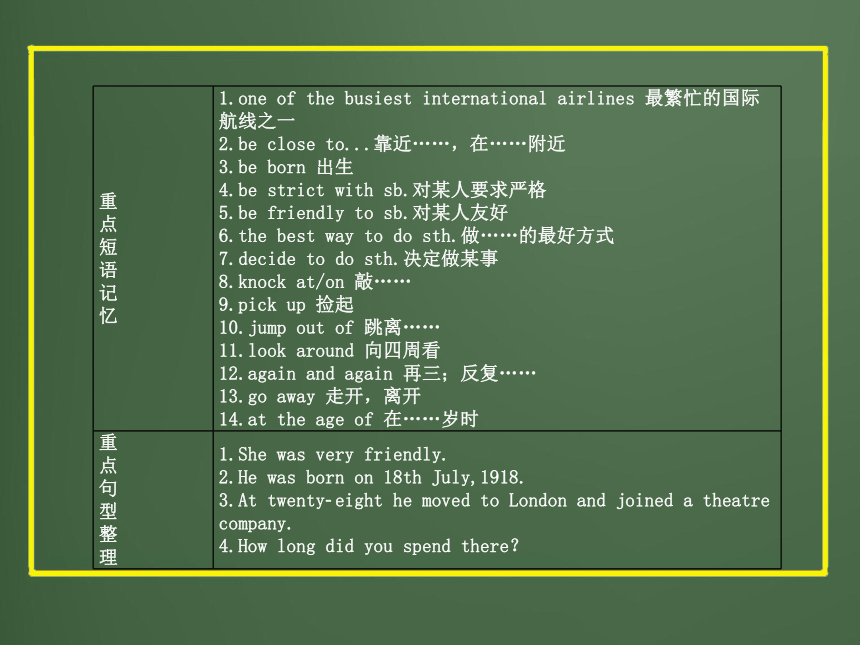
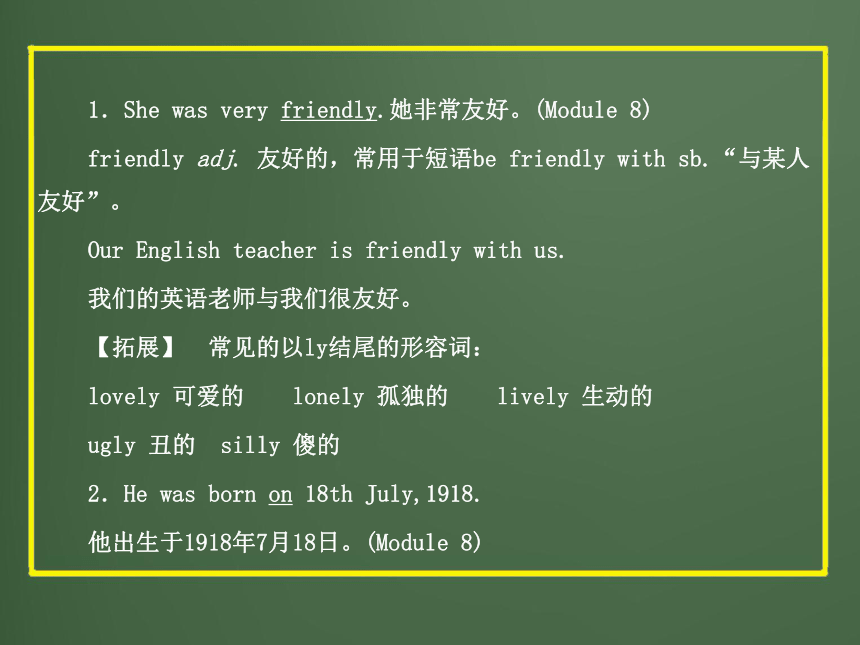
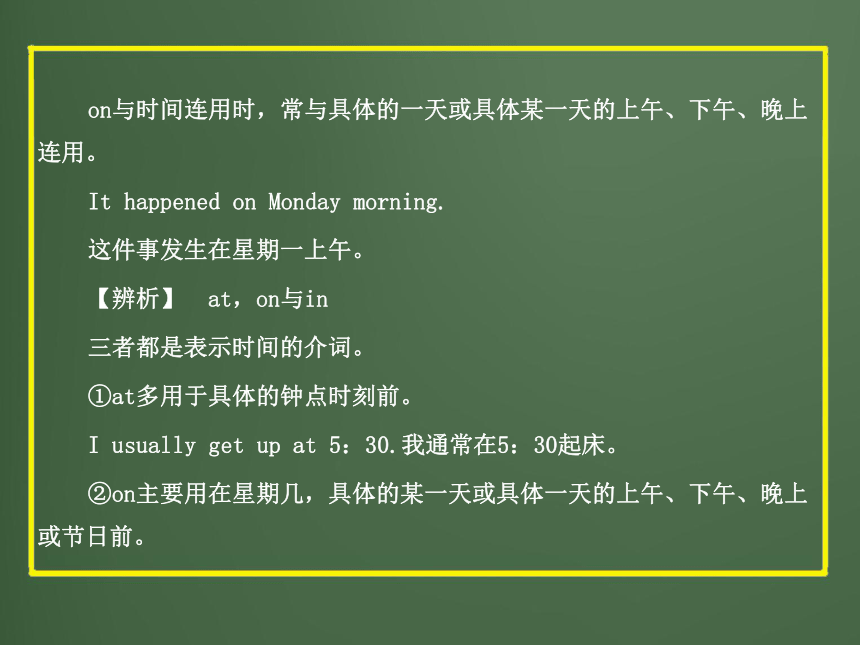
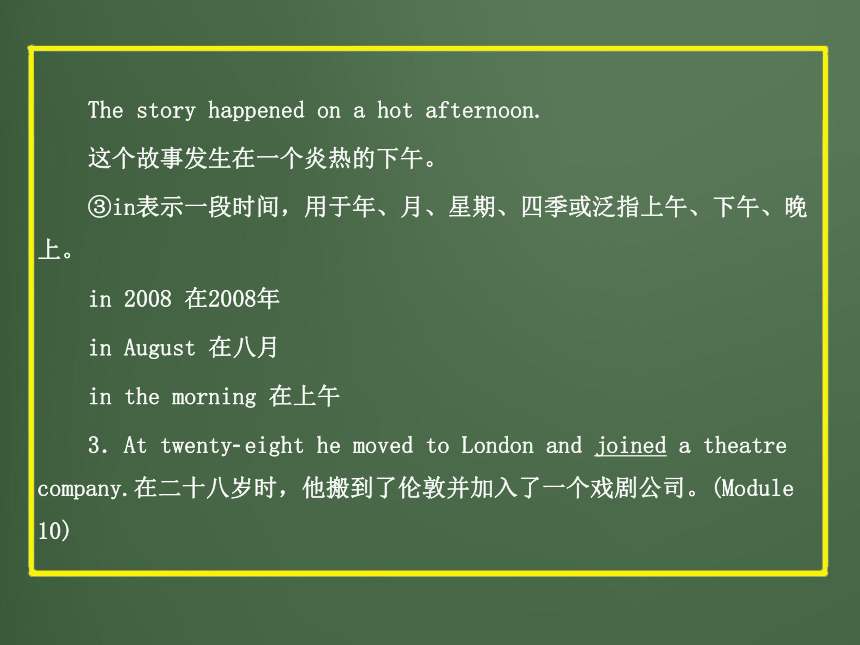
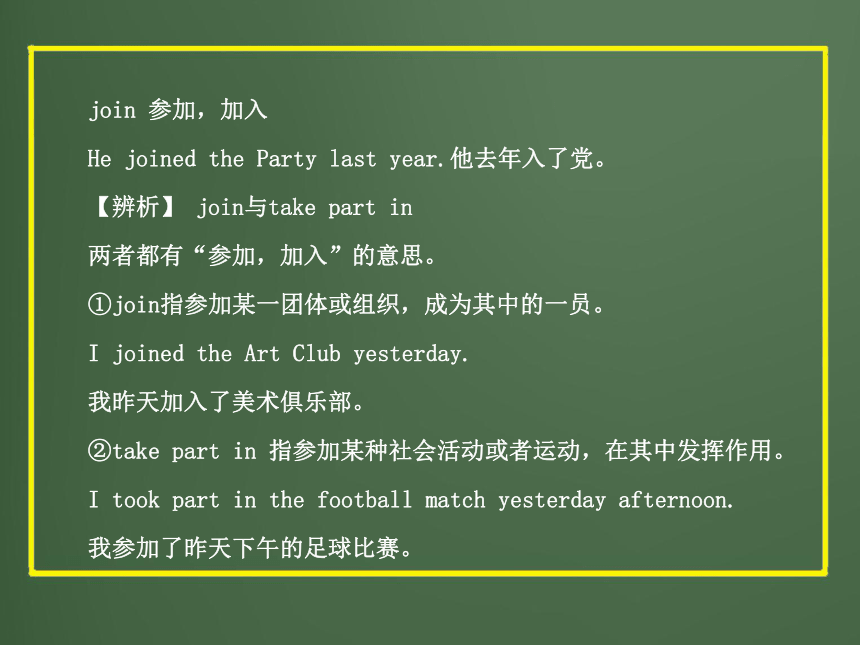
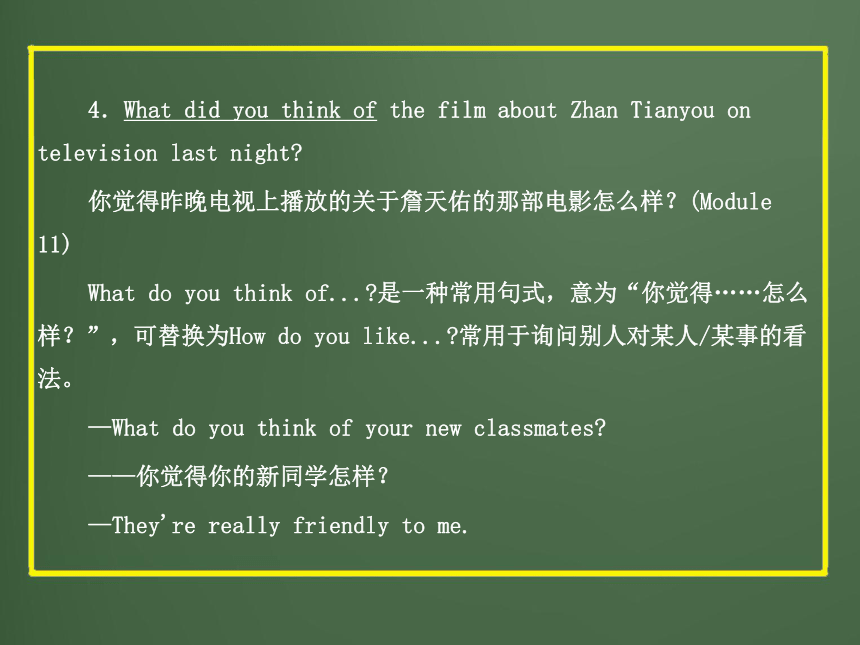
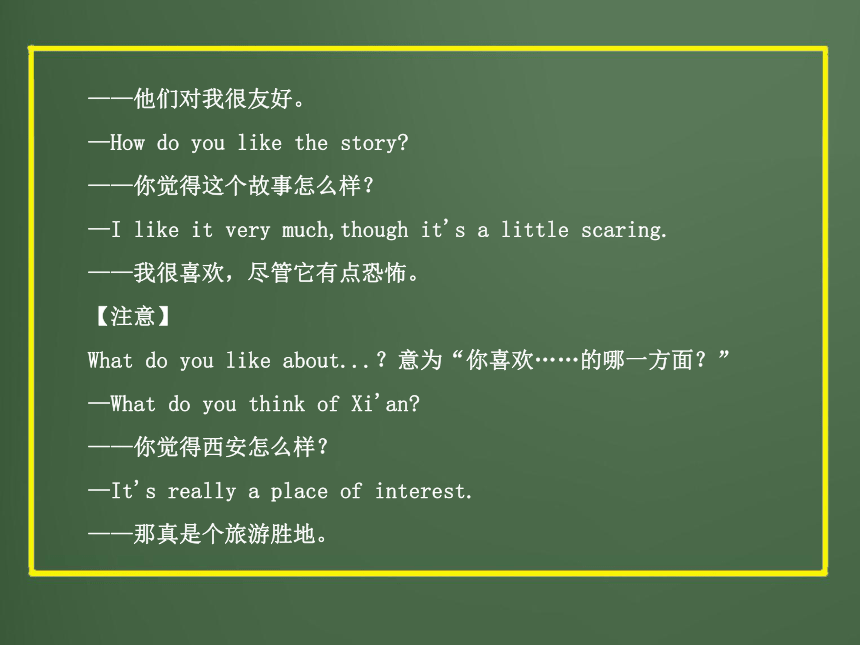
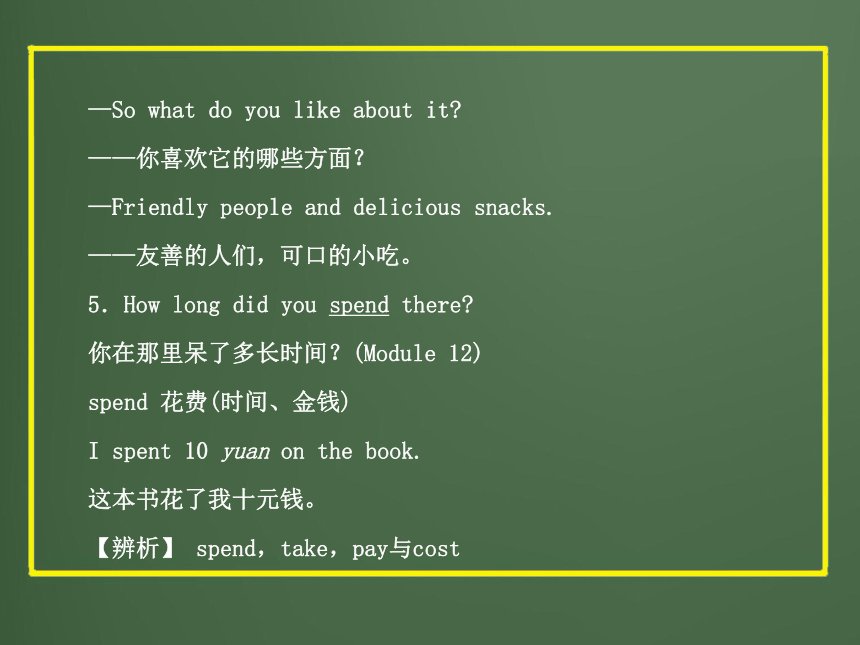
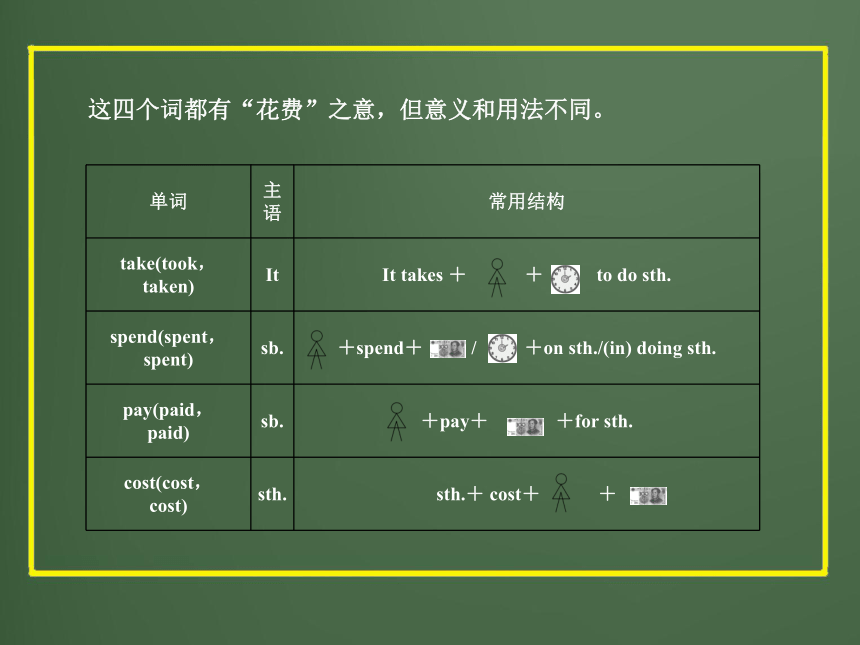
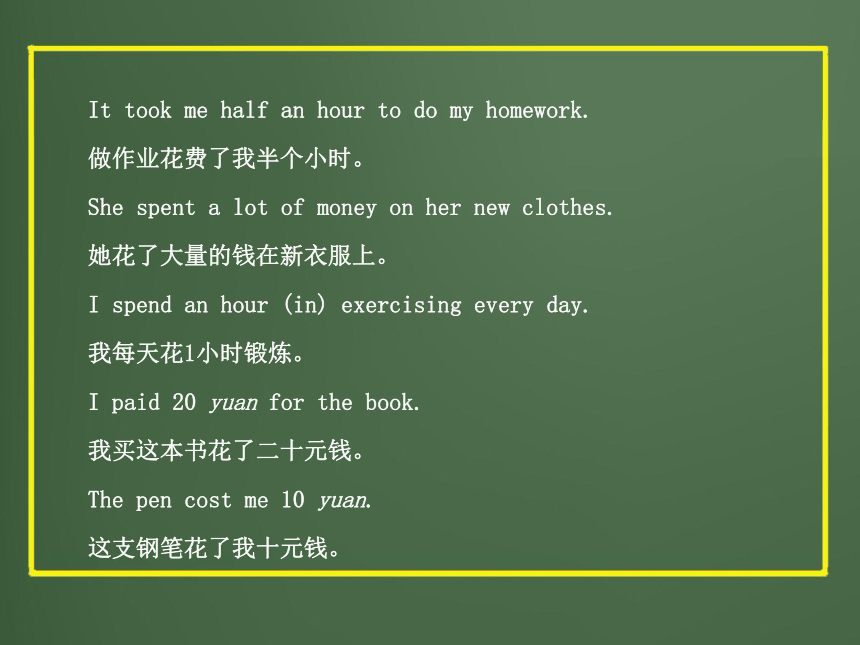
文档简介
(共45张PPT)
第四讲 七年级(下) Modules7~12
复习目标导航
考点完全攻略
同步训练
类别 新课标要求
重
点
词
汇
拓
展 1.quick→adv. 快地,迅速地 quickly
2.founder→v. 创建,建立 found
3.friendly→n. 朋友 friend→n.友谊 friendship→(反义词) adj. 不友好的 unfriendly
4.begin→n. 开始 beginning
5.push→(反义词)拉 pull
6.all→(反义词)一个都不,没有一个 none
7.unhappy→(反义词) adj. 高兴的 happy→n. 幸福 happiness
8.die→adj. 死的 dead→adj. 临终的,即将死去的 dying→n. 死亡 death
9.marry→adj. 结婚的 married→n. 婚姻 marriage
10.successful→n. 成功 success→v. 成功 succeed→adv. 成功地 successfully
11.safely→adj. 安全的 safe→n. 安全 safety
12.person→adj. 私人的 personal
重
点
短
语
记
忆 1.one of the busiest international airlines 最繁忙的国际航线之一
2.be close to...靠近……,在……附近
3.be born 出生
4.be strict with sb.对某人要求严格
5.be friendly to sb.对某人友好
6.the best way to do sth.做……的最好方式
7.decide to do sth.决定做某事
8.knock at/on 敲……
9.pick up 捡起
10.jump out of 跳离……
11.look around 向四周看
12.again and again 再三;反复……
13.go away 走开,离开
14.at the age of 在……岁时
重
点
句
型
整
理 1.She was very friendly.
2.He was born on 18th July,1918.
3.At twenty eight he moved to London and joined a theatre company.
4.How long did you spend there?
1.She was very friendly.她非常友好。(Module 8)
friendly adj. 友好的,常用于短语be friendly with sb.“与某人友好”。
Our English teacher is friendly with us.
我们的英语老师与我们很友好。
【拓展】 常见的以ly结尾的形容词:
lovely 可爱的 lonely 孤独的 lively 生动的
ugly 丑的 silly 傻的
2.He was born on 18th July,1918.
他出生于1918年7月18日。(Module 8)
on与时间连用时,常与具体的一天或具体某一天的上午、下午、晚上连用。
It happened on Monday morning.
这件事发生在星期一上午。
【辨析】 at,on与in
三者都是表示时间的介词。
①at多用于具体的钟点时刻前。
I usually get up at 5:30.我通常在5:30起床。
②on主要用在星期几,具体的某一天或具体一天的上午、下午、晚上或节日前。
The story happened on a hot afternoon.
这个故事发生在一个炎热的下午。
③in表示一段时间,用于年、月、星期、四季或泛指上午、下午、晚上。
in 2008 在2008年
in August 在八月
in the morning 在上午
3.At twenty eight he moved to London and joined a theatre company.在二十八岁时,他搬到了伦敦并加入了一个戏剧公司。(Module 10)
join 参加,加入
He joined the Party last year.他去年入了党。
【辨析】 join与take part in
两者都有“参加,加入”的意思。
①join指参加某一团体或组织,成为其中的一员。
I joined the Art Club yesterday.
我昨天加入了美术俱乐部。
②take part in 指参加某种社会活动或者运动,在其中发挥作用。
I took part in the football match yesterday afternoon.
我参加了昨天下午的足球比赛。
4.What did you think of the film about Zhan Tianyou on television last night
你觉得昨晚电视上播放的关于詹天佑的那部电影怎么样?(Module 11)
What do you think of... 是一种常用句式,意为“你觉得……怎么样?”,可替换为How do you like... 常用于询问别人对某人/某事的看法。
—What do you think of your new classmates
——你觉得你的新同学怎样?
—They're really friendly to me.
——他们对我很友好。
—How do you like the story
——你觉得这个故事怎么样?
—I like it very much,though it's a little scaring.
——我很喜欢,尽管它有点恐怖。
【注意】
What do you like about...?意为“你喜欢……的哪一方面?”
—What do you think of Xi'an
——你觉得西安怎么样?
—It's really a place of interest.
——那真是个旅游胜地。
—So what do you like about it
——你喜欢它的哪些方面?
—Friendly people and delicious snacks.
——友善的人们,可口的小吃。
5.How long did you spend there
你在那里呆了多长时间?(Module 12)
spend 花费(时间、金钱)
I spent 10 yuan on the book.
这本书花了我十元钱。
【辨析】 spend,take,pay与cost
这四个词都有“花费”之意,但意义和用法不同。
单词 主语 常用结构
take(took,
taken) It It takes + + to do sth.
spend(spent,
spent) sb. +spend+ / +on sth./(in) doing sth.
pay(paid,
paid) sb. +pay+ +for sth.
cost(cost,
cost) sth. sth.+ cost+ +
It took me half an hour to do my homework.
做作业花费了我半个小时。
She spent a lot of money on her new clothes.
她花了大量的钱在新衣服上。
I spend an hour (in) exercising every day.
我每天花1小时锻炼。
I paid 20 yuan for the book.
我买这本书花了二十元钱。
The pen cost me 10 yuan.
这支钢笔花了我十元钱。
七年级(下) Modules 7~12
(训练时间:60分钟 分值:100分)
基础知识过关
一、根据首字母及汉语意思写出下列单词(8分)
1.My father is always s_____________with me.
2.The boys were too naughty, they d______________the teacher's desk and made the teacher very unhappy.
3.In 1994, Mary m_____________Tom and they are very happy.
trict
estroyed
arried
4.He r________________home at 8:00 last night.
5.They b____________the house two years ago.
6.What's your favourite TV ___________(节目)
7.There are many ________________(乘客) on the bus.
8.The plane landed _________(安全地).
二、根据汉语意思完成英语句子(16分)
1.要建这样的铁路是很难的。
___ ___ _________ ____ _____ such a railroad.
eturned
ought
programme
passengers
safely
It is difficult to build
2.当他十岁的时候,他的家人移居去了北京。
His family _______ ______Beijing___ ____ _______ ________.
3.她花了两个小时完成这项工作。
She __________two hours ____________the work.
4.当你是个孩子时,你是骑自行车去上学吗?
Did you _______ ____ ________to school when you were a boy
5.我出生在一个小村庄里。
I ______ ______in a small village.
6.你觉得这本新辞典怎么样?
_____ ___ ____ _________ _____the new dictionary
moved to
at the age of ten
spent
finishing
ride a bike
was born
What do you think of
7.他急忙赶往医院。
He __________ _______the hospital.
8.他们正从超市里走出来。
They are walking ________ ______the supermarket.
三、用所给单词的适当形式填空(16分)
1.___________ (Lucy) mother is an English teacher.
2.We all like ___________(play) computer games.
3.There _____(be) a pair of trousers and two coats on the bed.
4._________(class) finish at five in the afternoon.
hurried to
out of
Lucy's
playing
is
Classes
5.We ________________(China) people are kind to others.
6.Han Mei, ___________(have) a seat, please.
7.Miss Zhang is our English teacher. We all like _______(she) very much.
8.The students have to do their ____________(homework) at late night.
Chinese
have
her
homework
综合能力提高
一、单项选择(10分)
1.(2011·广安)—How clean and tidy your bedroom is!
—Thank you. It________every day.
A.cleans B.is cleaned C.was cleaned
【解析】考查被动语态。It 指代上句中的bedroom,it和clean 构成被动关系,故用被动语态,由every day 可知,该句是一般现在时,故用一般现在时的被动语态。
【答案】B
2.—How was your weekend
—Great! We ________ a picnic by the lake.
A.have B.are having
C.had D.will have
【解析】考查动词时态。根据问句时态是过去时,而且时间是上周,所以答语应该为一般过去时,故答案为C。
【答案】C
3.(2011·安顺)The new kind of car is ________ dear, I don't have ________ money.
A.too much; much too B.much too; too much
C.too much; too much D.much too; much too
【解析】词义辨析。too much后面接不可数名词;much too接形容词。dear意为“昂贵的”是形容词,money 是不可数名词。故选B。
【答案】B
4.(2011·百色)Your computer doesn't work now, is there ________ with it
A.wrong something B.something wrong
C.wrong anything D.anything wrong
【解析】考查不定代词的用法。anything 用于否定句,修饰不定代词的词要放在不定代词的后面。
【答案】D
5.—________?
—He has big eyes and a round face.
A.What is Bob like
B.What does Bob do
C.What does Bob like
D.What does Bob look like
【解析】考查交际用语。根据答语描述的是一个人的外貌特征,所以推测问句应该是问对方长相,所以答案D合适。
【答案】D
6.—________late for school again, Tim!
—Sorry, I promise that I ________.
A.Don't; won't B.Don't be; won't
C.Don't be; don't D.Don't; will
【解析】考查祈使句。根据句意,答语应该是说保证将来不会再迟到,所以答案为选项B。
【答案】B
7.(2011·贵阳)“Marcia, could you please ________ my dog when I'm on vacation?”“Yes, sure.”
A.look after B.look at C.look for
【解析】根据句意“Marcia,当我度假的时候,你能帮我照看一下我的狗吗?”“是的,可以。”look after“照顾”;look at“看”;look for“寻找”。故选A。
【答案】A
8.Most of the young people enjoy ________ Jay Chou's songs.
A.sing B.sang
C.singing D.to sing
【解析】考查动词enjoy 的用法。enjoy+doing 是固定用法,所以本题答案为选项C。
【答案】C
8.Most of the young people enjoy ________ Jay Chou's songs.
A.sing B.sang
C.singing D.to sing
【解析】考查动词enjoy 的用法。enjoy+doing 是固定用法,所以本题答案为选项C。
【答案】C
9.—How do you like your Chinese teacher
—________.
A.Yes, I like him very much
B.He is very kind
C.I enjoy his class
D.His lesson is boring
【解析】考查交际用语中问一个怎么样。B项说他人很好,符合句意。
【答案】B
10.(2011·邵阳) —Could I borrow your computer, Bob
—Sorry, I am ________ it.
A.taking out B.turning on
C.working on
【解析】考查动词词组的词义。take out“拿出”;turn on“打开”;work on“忙于;使用”。句意为“鲍勃,我能用一下你的电脑吗?”“对不起,我正在使用。”故选C。
【答案】C
二、完形填空(15分)
Once a man and his wife worked for an old man. There was a big box in the old man's living room. The old man pointed to the box and said, “There's only one thing you __1__ do. Don't open the box.” __2__ saying this, he left his home.
The woman said to her husband, “There must be __3__ expensive in the box. Let's open it, shall we?” Her husband said __4__ to her. But the woman didn't give up her __5__. One day, she decided to find out __6__ was in it. Her husband didn't stop her. She opened the box and looked inside. To her surprise, she found nothing in the box. She tried hard to close it, but she __7__.
That evening the old man came home and found the box was __8__. He was very __9__ and asked the woman and her husband to leave his home.
“But there was nothing in the box,” the woman said. “We haven't taken anything at all.” The old man __10__ them, “The box is not important, but I cannot believe you. That's important!”
1.A.may not B.mustn't C.dare not D.needn't
【解析】may not“不可以”;mustn't “不准;不许”;dare not“不敢”;needn't “不必”。由下文“Don't open the box.”(不要打开这只箱子。)知“只有一件事你们不准做”,故选B。
【答案】B
2.A.After B.For C.By D.Before
【解析】after“在……之后”;for“因为;由于”;by“通过”;before“在……之前”。由题意“说完之后,他就离开了家”知选A。
【答案】A
3.A.nothing B.everything
C.something D.anything
【解析】nothing“没有什么”,表否定;everything“一切”;something“一些事物”,用于肯定句;anything“一些事/东西”,用于否定句或疑问句。由句意“箱子里肯定有些贵重的东西”可知选C。
【答案】C
4.A.no B.yes C.goodbye D.much
【解析】say no to sb.意为“对某人说不”。由上下文可知“她的丈夫对她说不(要打开)”,故选A。
【答案】A
5.A.work B.box C.way D.idea
【解析】work“工作”;box“箱子”;way“方法, 方式”;idea“想法,主意”。由上文“Let's open it”(让我们打开它)知“她没有放弃这个想法”,故选D。
【答案】D
6.A.which B.what C.who D.that
【解析】由句意“一天,她决定查明箱子里面有什么”可知应选B。which“哪一个”;what“什么”;who“谁”; that“那个”。
【答案】B
7.A.did B.refused C.failed D.succeeded
【解析】do“做”;refuse“拒绝”;fail“失败”;succeed“成功”。由上句“She tried hard to close it,...”(她费力地想关上它)及“but”说明她没能关上箱子(她失败了),故C项符合文意。
【答案】C
8.A.lost B.open C.empty D.broken
【解析】由上文“她尽力地去关上这只箱子,但是失败了”知“老人回家时,发现箱子开着”,故选B。
【答案】B
9.A.honest B.happy C.careful D.angry
【解析】由下文“老人让他们俩离开他的家”知“他很生气”。honest“诚实的”;happy“高兴的”;careful“细心的”;angry“生气的”,故选D。
【答案】D
10.A.turned to B.listened to C.shouted at D.smiled at
【解析】由下文“这只箱子不重要,但我不会信任你们,那是重要的!”知“老人向他们喊道”。shout at“向某人大喊”,故选C。
【答案】C
三、阅读理解(10分)
Americans spend their weekends in different ways. But usually they choose the same aim(目的)—to rest, to enjoy beautiful places and to enjoy the time with their family and friends.
Some Americans hold parties on Saturday night. __1__ Then they won't get up until 9,10 or even 11 o' clock next morning. As soon as they get up they will go to the nearest corner shop to buy the daily newspaper(日报). __2__ It will help them to decide what to do on Sunday afternoon.
Before going out on Sunday, they will have a meal, which is called “brunch”—“br” from “breakfast” and “unch” from “lunch”. __3__ After brunch some Americans may have a picnic with their family or friends. They will take many things with them, such as fresh vegetables, seafood, drinks, table cloth(桌布) and so on. Usually they drive to a beautiful park, a lake or the seaside.
__4__ It is the biggest meal of the week and all family members try to present(出席).
Weekends are to be welcome everywhere. __5__
将下列选项填入文中,使文章通顺、完整。
A.They will make it at home or go to a restaurant nearby.
B.They will dance, sing and drink together till mid night.
C.They can sell a lot of things there every day.
D.Most people look forward to the coming weekends.
E.They can get news about films, plays, shows and sports in the paper.
F.Sunday dinner is the most important meal of the week.
1.【解析】上句是有关周六晚上举行聚会的,下句应介绍其内容,故B项最合适。
【答案】B
2.【解析】上句是“他们一起床,就去最近的街角商店买日报。”本句应与日报有关,故E项最合适。
【答案】E
3.【解析】本段主要描写了吃饭的情况,选项A给出了吃饭的地点。故A项最合适。
【答案】A
4.【解析】下句意为“这是一周中最丰盛的一顿饭,所有家庭成员都尽量出席。”这说明这顿饭很重要。故F项最合适。
【答案】F
5.【解析】上句意为“周末在每个地方都受到欢迎。”选项D“大部分人盼望周末的到来。”最合适。
【答案】D
四、从方框中选择合适的选项完成对话(10分)
A:Hello! May I speak to Tom, please
B:Speaking. __1__
A:This is Bill. I called you yesterday, but you were not at home.
B:__2_ I need to prepare something for my trip to Shanghai.
A:Shanghai That's where the World Exposition(世博会) was held. How lucky you are!
B:So I am. __3__
A:I'll have a birthday party next Friday. Would you like to
come
B:__4__ My plane will take off next Wednesday.
A:What a pity(遗憾) that you can't come! __5__
B:Thank you very much. Bye!
A:Bye!
【答案】AEGBD
五、书面表达(15分)
请以“How to Be a Good Child?”为题写一篇小作文。字数:80~100词。
提示:可以从在校内、校外和在家里该怎么做等方面入手来写。
温馨提示:短文中请勿使用真实姓名、地点或所在学校名称。
How to Be A Good Child?
______________________________
参考范文:
How to Be A Good Child
Now there is only one child in a family. Our parents love us
very much. They can give us enough money and food. Then as a child, how can we do well
As a child, we should respect parents and teachers. At school, we should study well and finish our homework carefully. When we are at home, we should help mother do some housework. In the public, we’d better not talk loudly. Don’t throw litter or spit everywhere.
At last, I think it’s very important for us to do everything on time and keep promises.
第四讲 七年级(下) Modules7~12
复习目标导航
考点完全攻略
同步训练
类别 新课标要求
重
点
词
汇
拓
展 1.quick→adv. 快地,迅速地 quickly
2.founder→v. 创建,建立 found
3.friendly→n. 朋友 friend→n.友谊 friendship→(反义词) adj. 不友好的 unfriendly
4.begin→n. 开始 beginning
5.push→(反义词)拉 pull
6.all→(反义词)一个都不,没有一个 none
7.unhappy→(反义词) adj. 高兴的 happy→n. 幸福 happiness
8.die→adj. 死的 dead→adj. 临终的,即将死去的 dying→n. 死亡 death
9.marry→adj. 结婚的 married→n. 婚姻 marriage
10.successful→n. 成功 success→v. 成功 succeed→adv. 成功地 successfully
11.safely→adj. 安全的 safe→n. 安全 safety
12.person→adj. 私人的 personal
重
点
短
语
记
忆 1.one of the busiest international airlines 最繁忙的国际航线之一
2.be close to...靠近……,在……附近
3.be born 出生
4.be strict with sb.对某人要求严格
5.be friendly to sb.对某人友好
6.the best way to do sth.做……的最好方式
7.decide to do sth.决定做某事
8.knock at/on 敲……
9.pick up 捡起
10.jump out of 跳离……
11.look around 向四周看
12.again and again 再三;反复……
13.go away 走开,离开
14.at the age of 在……岁时
重
点
句
型
整
理 1.She was very friendly.
2.He was born on 18th July,1918.
3.At twenty eight he moved to London and joined a theatre company.
4.How long did you spend there?
1.She was very friendly.她非常友好。(Module 8)
friendly adj. 友好的,常用于短语be friendly with sb.“与某人友好”。
Our English teacher is friendly with us.
我们的英语老师与我们很友好。
【拓展】 常见的以ly结尾的形容词:
lovely 可爱的 lonely 孤独的 lively 生动的
ugly 丑的 silly 傻的
2.He was born on 18th July,1918.
他出生于1918年7月18日。(Module 8)
on与时间连用时,常与具体的一天或具体某一天的上午、下午、晚上连用。
It happened on Monday morning.
这件事发生在星期一上午。
【辨析】 at,on与in
三者都是表示时间的介词。
①at多用于具体的钟点时刻前。
I usually get up at 5:30.我通常在5:30起床。
②on主要用在星期几,具体的某一天或具体一天的上午、下午、晚上或节日前。
The story happened on a hot afternoon.
这个故事发生在一个炎热的下午。
③in表示一段时间,用于年、月、星期、四季或泛指上午、下午、晚上。
in 2008 在2008年
in August 在八月
in the morning 在上午
3.At twenty eight he moved to London and joined a theatre company.在二十八岁时,他搬到了伦敦并加入了一个戏剧公司。(Module 10)
join 参加,加入
He joined the Party last year.他去年入了党。
【辨析】 join与take part in
两者都有“参加,加入”的意思。
①join指参加某一团体或组织,成为其中的一员。
I joined the Art Club yesterday.
我昨天加入了美术俱乐部。
②take part in 指参加某种社会活动或者运动,在其中发挥作用。
I took part in the football match yesterday afternoon.
我参加了昨天下午的足球比赛。
4.What did you think of the film about Zhan Tianyou on television last night
你觉得昨晚电视上播放的关于詹天佑的那部电影怎么样?(Module 11)
What do you think of... 是一种常用句式,意为“你觉得……怎么样?”,可替换为How do you like... 常用于询问别人对某人/某事的看法。
—What do you think of your new classmates
——你觉得你的新同学怎样?
—They're really friendly to me.
——他们对我很友好。
—How do you like the story
——你觉得这个故事怎么样?
—I like it very much,though it's a little scaring.
——我很喜欢,尽管它有点恐怖。
【注意】
What do you like about...?意为“你喜欢……的哪一方面?”
—What do you think of Xi'an
——你觉得西安怎么样?
—It's really a place of interest.
——那真是个旅游胜地。
—So what do you like about it
——你喜欢它的哪些方面?
—Friendly people and delicious snacks.
——友善的人们,可口的小吃。
5.How long did you spend there
你在那里呆了多长时间?(Module 12)
spend 花费(时间、金钱)
I spent 10 yuan on the book.
这本书花了我十元钱。
【辨析】 spend,take,pay与cost
这四个词都有“花费”之意,但意义和用法不同。
单词 主语 常用结构
take(took,
taken) It It takes + + to do sth.
spend(spent,
spent) sb. +spend+ / +on sth./(in) doing sth.
pay(paid,
paid) sb. +pay+ +for sth.
cost(cost,
cost) sth. sth.+ cost+ +
It took me half an hour to do my homework.
做作业花费了我半个小时。
She spent a lot of money on her new clothes.
她花了大量的钱在新衣服上。
I spend an hour (in) exercising every day.
我每天花1小时锻炼。
I paid 20 yuan for the book.
我买这本书花了二十元钱。
The pen cost me 10 yuan.
这支钢笔花了我十元钱。
七年级(下) Modules 7~12
(训练时间:60分钟 分值:100分)
基础知识过关
一、根据首字母及汉语意思写出下列单词(8分)
1.My father is always s_____________with me.
2.The boys were too naughty, they d______________the teacher's desk and made the teacher very unhappy.
3.In 1994, Mary m_____________Tom and they are very happy.
trict
estroyed
arried
4.He r________________home at 8:00 last night.
5.They b____________the house two years ago.
6.What's your favourite TV ___________(节目)
7.There are many ________________(乘客) on the bus.
8.The plane landed _________(安全地).
二、根据汉语意思完成英语句子(16分)
1.要建这样的铁路是很难的。
___ ___ _________ ____ _____ such a railroad.
eturned
ought
programme
passengers
safely
It is difficult to build
2.当他十岁的时候,他的家人移居去了北京。
His family _______ ______Beijing___ ____ _______ ________.
3.她花了两个小时完成这项工作。
She __________two hours ____________the work.
4.当你是个孩子时,你是骑自行车去上学吗?
Did you _______ ____ ________to school when you were a boy
5.我出生在一个小村庄里。
I ______ ______in a small village.
6.你觉得这本新辞典怎么样?
_____ ___ ____ _________ _____the new dictionary
moved to
at the age of ten
spent
finishing
ride a bike
was born
What do you think of
7.他急忙赶往医院。
He __________ _______the hospital.
8.他们正从超市里走出来。
They are walking ________ ______the supermarket.
三、用所给单词的适当形式填空(16分)
1.___________ (Lucy) mother is an English teacher.
2.We all like ___________(play) computer games.
3.There _____(be) a pair of trousers and two coats on the bed.
4._________(class) finish at five in the afternoon.
hurried to
out of
Lucy's
playing
is
Classes
5.We ________________(China) people are kind to others.
6.Han Mei, ___________(have) a seat, please.
7.Miss Zhang is our English teacher. We all like _______(she) very much.
8.The students have to do their ____________(homework) at late night.
Chinese
have
her
homework
综合能力提高
一、单项选择(10分)
1.(2011·广安)—How clean and tidy your bedroom is!
—Thank you. It________every day.
A.cleans B.is cleaned C.was cleaned
【解析】考查被动语态。It 指代上句中的bedroom,it和clean 构成被动关系,故用被动语态,由every day 可知,该句是一般现在时,故用一般现在时的被动语态。
【答案】B
2.—How was your weekend
—Great! We ________ a picnic by the lake.
A.have B.are having
C.had D.will have
【解析】考查动词时态。根据问句时态是过去时,而且时间是上周,所以答语应该为一般过去时,故答案为C。
【答案】C
3.(2011·安顺)The new kind of car is ________ dear, I don't have ________ money.
A.too much; much too B.much too; too much
C.too much; too much D.much too; much too
【解析】词义辨析。too much后面接不可数名词;much too接形容词。dear意为“昂贵的”是形容词,money 是不可数名词。故选B。
【答案】B
4.(2011·百色)Your computer doesn't work now, is there ________ with it
A.wrong something B.something wrong
C.wrong anything D.anything wrong
【解析】考查不定代词的用法。anything 用于否定句,修饰不定代词的词要放在不定代词的后面。
【答案】D
5.—________?
—He has big eyes and a round face.
A.What is Bob like
B.What does Bob do
C.What does Bob like
D.What does Bob look like
【解析】考查交际用语。根据答语描述的是一个人的外貌特征,所以推测问句应该是问对方长相,所以答案D合适。
【答案】D
6.—________late for school again, Tim!
—Sorry, I promise that I ________.
A.Don't; won't B.Don't be; won't
C.Don't be; don't D.Don't; will
【解析】考查祈使句。根据句意,答语应该是说保证将来不会再迟到,所以答案为选项B。
【答案】B
7.(2011·贵阳)“Marcia, could you please ________ my dog when I'm on vacation?”“Yes, sure.”
A.look after B.look at C.look for
【解析】根据句意“Marcia,当我度假的时候,你能帮我照看一下我的狗吗?”“是的,可以。”look after“照顾”;look at“看”;look for“寻找”。故选A。
【答案】A
8.Most of the young people enjoy ________ Jay Chou's songs.
A.sing B.sang
C.singing D.to sing
【解析】考查动词enjoy 的用法。enjoy+doing 是固定用法,所以本题答案为选项C。
【答案】C
8.Most of the young people enjoy ________ Jay Chou's songs.
A.sing B.sang
C.singing D.to sing
【解析】考查动词enjoy 的用法。enjoy+doing 是固定用法,所以本题答案为选项C。
【答案】C
9.—How do you like your Chinese teacher
—________.
A.Yes, I like him very much
B.He is very kind
C.I enjoy his class
D.His lesson is boring
【解析】考查交际用语中问一个怎么样。B项说他人很好,符合句意。
【答案】B
10.(2011·邵阳) —Could I borrow your computer, Bob
—Sorry, I am ________ it.
A.taking out B.turning on
C.working on
【解析】考查动词词组的词义。take out“拿出”;turn on“打开”;work on“忙于;使用”。句意为“鲍勃,我能用一下你的电脑吗?”“对不起,我正在使用。”故选C。
【答案】C
二、完形填空(15分)
Once a man and his wife worked for an old man. There was a big box in the old man's living room. The old man pointed to the box and said, “There's only one thing you __1__ do. Don't open the box.” __2__ saying this, he left his home.
The woman said to her husband, “There must be __3__ expensive in the box. Let's open it, shall we?” Her husband said __4__ to her. But the woman didn't give up her __5__. One day, she decided to find out __6__ was in it. Her husband didn't stop her. She opened the box and looked inside. To her surprise, she found nothing in the box. She tried hard to close it, but she __7__.
That evening the old man came home and found the box was __8__. He was very __9__ and asked the woman and her husband to leave his home.
“But there was nothing in the box,” the woman said. “We haven't taken anything at all.” The old man __10__ them, “The box is not important, but I cannot believe you. That's important!”
1.A.may not B.mustn't C.dare not D.needn't
【解析】may not“不可以”;mustn't “不准;不许”;dare not“不敢”;needn't “不必”。由下文“Don't open the box.”(不要打开这只箱子。)知“只有一件事你们不准做”,故选B。
【答案】B
2.A.After B.For C.By D.Before
【解析】after“在……之后”;for“因为;由于”;by“通过”;before“在……之前”。由题意“说完之后,他就离开了家”知选A。
【答案】A
3.A.nothing B.everything
C.something D.anything
【解析】nothing“没有什么”,表否定;everything“一切”;something“一些事物”,用于肯定句;anything“一些事/东西”,用于否定句或疑问句。由句意“箱子里肯定有些贵重的东西”可知选C。
【答案】C
4.A.no B.yes C.goodbye D.much
【解析】say no to sb.意为“对某人说不”。由上下文可知“她的丈夫对她说不(要打开)”,故选A。
【答案】A
5.A.work B.box C.way D.idea
【解析】work“工作”;box“箱子”;way“方法, 方式”;idea“想法,主意”。由上文“Let's open it”(让我们打开它)知“她没有放弃这个想法”,故选D。
【答案】D
6.A.which B.what C.who D.that
【解析】由句意“一天,她决定查明箱子里面有什么”可知应选B。which“哪一个”;what“什么”;who“谁”; that“那个”。
【答案】B
7.A.did B.refused C.failed D.succeeded
【解析】do“做”;refuse“拒绝”;fail“失败”;succeed“成功”。由上句“She tried hard to close it,...”(她费力地想关上它)及“but”说明她没能关上箱子(她失败了),故C项符合文意。
【答案】C
8.A.lost B.open C.empty D.broken
【解析】由上文“她尽力地去关上这只箱子,但是失败了”知“老人回家时,发现箱子开着”,故选B。
【答案】B
9.A.honest B.happy C.careful D.angry
【解析】由下文“老人让他们俩离开他的家”知“他很生气”。honest“诚实的”;happy“高兴的”;careful“细心的”;angry“生气的”,故选D。
【答案】D
10.A.turned to B.listened to C.shouted at D.smiled at
【解析】由下文“这只箱子不重要,但我不会信任你们,那是重要的!”知“老人向他们喊道”。shout at“向某人大喊”,故选C。
【答案】C
三、阅读理解(10分)
Americans spend their weekends in different ways. But usually they choose the same aim(目的)—to rest, to enjoy beautiful places and to enjoy the time with their family and friends.
Some Americans hold parties on Saturday night. __1__ Then they won't get up until 9,10 or even 11 o' clock next morning. As soon as they get up they will go to the nearest corner shop to buy the daily newspaper(日报). __2__ It will help them to decide what to do on Sunday afternoon.
Before going out on Sunday, they will have a meal, which is called “brunch”—“br” from “breakfast” and “unch” from “lunch”. __3__ After brunch some Americans may have a picnic with their family or friends. They will take many things with them, such as fresh vegetables, seafood, drinks, table cloth(桌布) and so on. Usually they drive to a beautiful park, a lake or the seaside.
__4__ It is the biggest meal of the week and all family members try to present(出席).
Weekends are to be welcome everywhere. __5__
将下列选项填入文中,使文章通顺、完整。
A.They will make it at home or go to a restaurant nearby.
B.They will dance, sing and drink together till mid night.
C.They can sell a lot of things there every day.
D.Most people look forward to the coming weekends.
E.They can get news about films, plays, shows and sports in the paper.
F.Sunday dinner is the most important meal of the week.
1.【解析】上句是有关周六晚上举行聚会的,下句应介绍其内容,故B项最合适。
【答案】B
2.【解析】上句是“他们一起床,就去最近的街角商店买日报。”本句应与日报有关,故E项最合适。
【答案】E
3.【解析】本段主要描写了吃饭的情况,选项A给出了吃饭的地点。故A项最合适。
【答案】A
4.【解析】下句意为“这是一周中最丰盛的一顿饭,所有家庭成员都尽量出席。”这说明这顿饭很重要。故F项最合适。
【答案】F
5.【解析】上句意为“周末在每个地方都受到欢迎。”选项D“大部分人盼望周末的到来。”最合适。
【答案】D
四、从方框中选择合适的选项完成对话(10分)
A:Hello! May I speak to Tom, please
B:Speaking. __1__
A:This is Bill. I called you yesterday, but you were not at home.
B:__2_ I need to prepare something for my trip to Shanghai.
A:Shanghai That's where the World Exposition(世博会) was held. How lucky you are!
B:So I am. __3__
A:I'll have a birthday party next Friday. Would you like to
come
B:__4__ My plane will take off next Wednesday.
A:What a pity(遗憾) that you can't come! __5__
B:Thank you very much. Bye!
A:Bye!
【答案】AEGBD
五、书面表达(15分)
请以“How to Be a Good Child?”为题写一篇小作文。字数:80~100词。
提示:可以从在校内、校外和在家里该怎么做等方面入手来写。
温馨提示:短文中请勿使用真实姓名、地点或所在学校名称。
How to Be A Good Child?
______________________________
参考范文:
How to Be A Good Child
Now there is only one child in a family. Our parents love us
very much. They can give us enough money and food. Then as a child, how can we do well
As a child, we should respect parents and teachers. At school, we should study well and finish our homework carefully. When we are at home, we should help mother do some housework. In the public, we’d better not talk loudly. Don’t throw litter or spit everywhere.
At last, I think it’s very important for us to do everything on time and keep promises.
